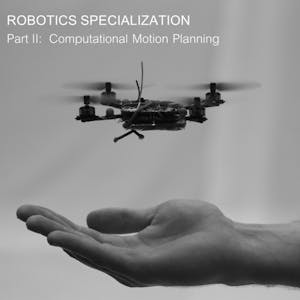Embark on a deep exploration of Robotics: Computational Motion Planning, a course that delves into the core aspects of motion planning for robotic systems. Throughout this comprehensive learning journey, you will unravel the intricate problem-solving methods essential for enabling robots to navigate and interact effectively within their environment.
Robotic systems are multifaceted, comprising a mechanism capable of exerting forces and torques on the environment, a perception system for sensing the world, and a decision and control system that modulates the robot's behavior to achieve desired ends. The course focuses on the pivotal component of motion planning, addressing the challenge of how robots decide what actions to take to accomplish their goals.
Throughout the course, you will grapple with the challenges that make planning in the context of robotics a complex and dynamic endeavor. By the course's conclusion, you will have developed a robust understanding of the various approaches to addressing motion planning, equipping you with essential knowledge and skills to navigate the intricate landscape of robotics.
Certificate Available ✔
Get Started / More Info
This course comprises four modules that delve into graph-based methods, configuration space, sampling-based planning methods, and artificial potential field methods, providing comprehensive insights into motion planning for robotic systems.
Embark on your learning journey with an introduction to Computational Motion Planning and delve into graph-based planning methods. Gain insights into algorithms like the Grassfire Algorithm, Dijkstra's Algorithm, and A* Algorithm, and explore the application of MATLAB in computational motion planning.
Module 2 delves into Configuration Space, offering a comprehensive understanding of its intricacies. Explore the RR arm, Piano Mover’s Problem, Visibility Graph, and Trapezoidal Decomposition, and engage in assignments that deepen your practical knowledge of Configuration Space.
Sampling-based Planning Methods take center stage in Module 3. Uncover the nuances of Probabilistic Road Maps and Rapidly Exploring Random Trees, addressing the issues and challenges associated with these approaches. Engage in practical assignments to apply your knowledge in this domain.
Module 4 focuses on Artificial Potential Field Methods, guiding you through the construction of artificial potential fields and the resolution of issues such as local minima. Gain a comprehensive understanding of this approach and its application in motion planning for robotic systems.
Semiconductor Packaging provides a foundational understanding of packaging design, manufacturing, and future challenges in the semiconductor industry.
Fabrication additive: l'impression 3D dans l'industrie offers comprehensive insights into additive manufacturing technologies and their industrial applications.
Material Jetting and Stereolithography is a comprehensive course covering two photopolymer resin-based processes. Students will gain insights into build preparation,...
Single-Phase Pipe Hydraulics & Pipe Sizing course equips learners with comprehensive knowledge of fluid flow through pipes, pressure drop calculations, and piping...